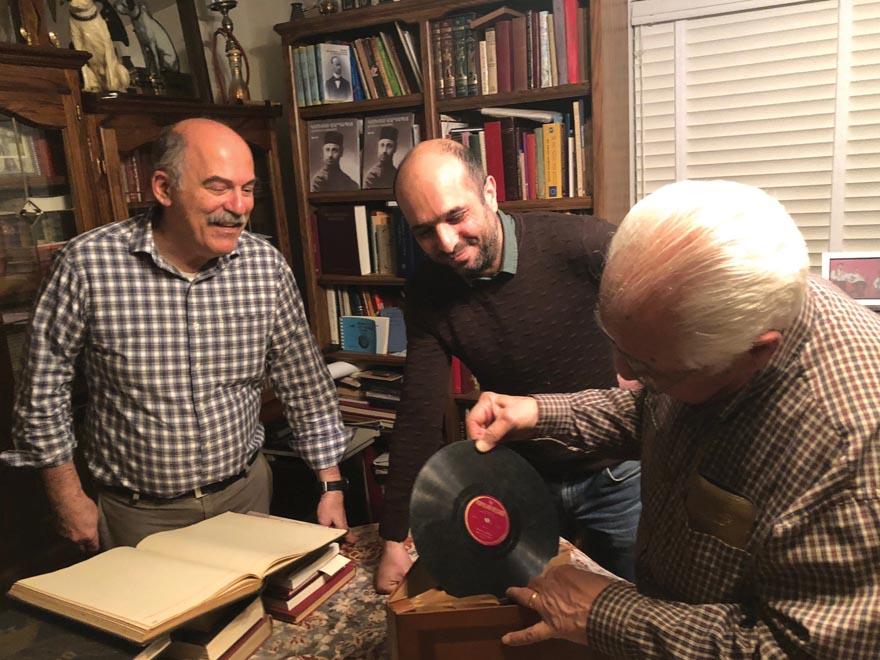
Türkyılmaz, and Richard Hagopian examining early Armenian
records.
Photo: Jim Karagozian
Michael Rettig
Editor
Dr. Yektan Türkyılmaz has had a busy semester since his appointment as the 14th Kazan Visiting Professor at Fresno State for Spring 2018. In addition to teaching a course on “Armenian Urbanism,” and preparing for three public lectures, Dr. Türkyılmaz is spending his time in Fresno preparing his dissertation for publication as a monograph.
Dr. Türkyılmaz grew up in a small town east of Sivas. Although he was never exposed to Armenian history in school, Dr. Türkyılmaz grew up with an awareness of Armenians and their past. One of his classmates in elementary school, the daughter of the local carpenter, was an Armenian, as well as some of his parents’ friends. “I grew up with an awareness that there used to be more Armenians and that something happened to them, so there were eventually less of them,” Dr. Türkyılmaz recalled. “We heard the stories from our grandparents. They spoke of rivers flowing red with blood.”
Dr. Türkyılmaz’s interest in the Kurdish issue led him to learn more about what happened to the Armenians. Turkey’s treatment of the Kurds is a “wound that let another hidden wound bleed again,” according to Dr. Türkyılmaz.
When Dr. Türkyılmaz moved to Istanbul at an early age, he discovered that it was difficult for non-Armenians to learn Armenian in Turkey because they could not legally attend Armenian schools. He found a retired technician, Moushegh Najarian, teaching Armenian to Armenian migrants from the eastern provinces who were interested in connecting with their heritage. Dr. Türkyılmaz became one of his more than 100 students, and after many lessons, was ironically the only student to become fluent in Armenian. His proficiency in Armenian was especially useful while he was researching in the National Archives of Armenia for his dissertation, “Rethinking Genocide: Violence and Victim-hood in Eastern Anatolia, 1913-1915.” His dissertation explores the tension and debates among Armenians on the eve of the Genocide and the state’s decision making process that would eventually mark the Armenians for extermination.
Dr. Türkyılmaz was the first Turkish citizen to conduct research in Armenia. It is his ongoing goal to incorporate many of the neglected Armenian sources into the study of the Genocide. Dr. Türkyılmaz noted that historians in the past have gravitated to more “objective” sources, such as diplomatic records and official archives, but ended up leaving out the voice of the victims themselves.
Dr. Türkyılmaz stressed that his goal in Armenia was not to find “smoking gun” evidence of the Armenian Genocide, but to discover what the Armenians were thinking about their future before the “unexpected storm” that the Ottoman government inflicted on them.
According to Dr. Türkyılmaz, research should not be conducted with the intention of combating denialists. “It was a genocide, period. Any denial of this fact is not about a lack of knowledge or evidence, it is a political position,” explained Dr. Türkyılmaz. “Facts will not convince denialists, it will only change their argument.”
Though he found useful archives in Armenia, Dr. Türkyılmaz noted that his most rewarding experience was interacting with the people. “I am an anthropologist. We don’t just read documents; we read people, communities, and cultures.” Curious descendants of survivors recognized Dr. Türkyılmaz from his local television interviews and stopped him in the street to ask him questions. “People could not believe someone would visit just for research.”
Dr. Türkyılmaz was particularly interested in how trauma continues to affect Armenians throughout the generations. While in Armenia he interviewed Mr. H. Minassian, a genocide survivor from Van, who sparked his interest in the region. “In him I saw this Vanetsi pride. Over 90 years had passed, yet he was sure he would return to those lands,” Dr. Türkyılmaz recollected. The region of Van/Vaspurakan became an important focus of Dr. Türkyılmaz’s dissertation.
After he completed his dissertation at Duke University in 2012, Dr. Türkyılmaz taught at the Sabanci and Bilgi Universities in Turkey. He currently has a post-doctoral fellowship at the Forum Transregionale Studien, a Berlin-based research organization.
Dr. Türkyılmaz did not initially know what to expect when he accepted his position at Fresno State, but he appreciates Fresno’s charm, and the opportunity to escape from Berlin’s many distractions.
In addition to teaching his class, Dr. Türkyılmaz is organizing the Armenian Studies Program’s collection of early records in order to make them available to researchers. Dr. Türkyılmaz’s interest in music and records stretches back to his childhood in Turkey when his father brought home a gramophone. His musical interest expanded at Duke University, where he began to analyze the effect records had on the way people thought about music and society.
Dr. Türkyılmaz also uses early recordings to supplement his classroom lessons. He played Groung for his students when they were analyzing the diasporic experience. “The song says more than 1,000 pages would about longing for one’s homeland,” Dr. Türkyılmaz explained.
Dr. Türkyılmaz has had the opportunity to meet with several local musicians, including a visit with master oudist Richard Hagopian. “All of the Armenians that I had learned about through records, he knew in person,” said Dr. Türkyılmaz. “He has a fantastic memory and a great knowledge of books and records.”
Dr. Türkyılmaz is enjoying his stay in Fresno and has met many wonderful people.
“The Armenians here have a rare and genuine curiosity about their culture and history.”
 Hye Sharzhoom Armenian Action
Hye Sharzhoom Armenian Action